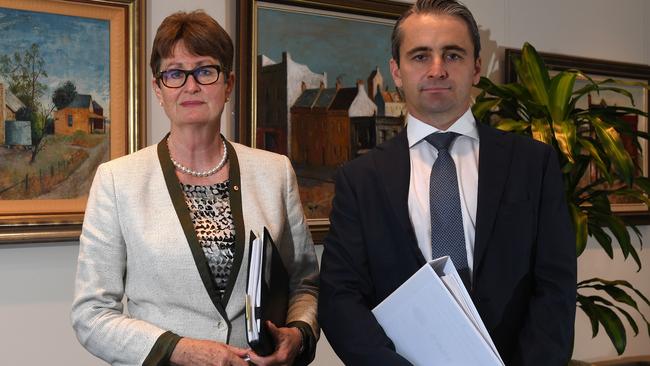Pay cuts for executives as CBA stung over failures
The CBA is expected to cut executive pay again this year and has been slammed for a culture where no one learned from mistakes.

Australia’s biggest bank, CBA, is expected to cut executive pay again this year but is resisting calls for more senior staff to be sacked in the wake of a damning report into failures of culture, accountability and governance exposed during Austrac’s money-laundering investigation.
The Australian Prudential Regulation Authority imposed a $1 billion capital penalty and a court-enforceable agreement to implement 35 changes recommended by a high-powered panel that found CBA’s long record of huge profits led to a “dulling of the senses within the board” to growing non-financial risks.
CBA chairwoman Catherine Livingstone admitted the report was “upfront and confronting” but would be followed in full, as the company strived to restore a reputation battered by years of scandals.
CBA’s market value has fallen by $13bn since the Turnbull government announced the royal commission. The big four banks and AMP combined have shed $28.5bn in value.
Scott Morrison said he expected CBA board members and executives to resign, adding that the report should send a warning to other banks and companies.
“A number of board members and executives have already gone,” the Treasurer said. “My understanding is there will be others who will be leaving and that’s what I expect to happen.”
But CBA said it had already lost a number of top executives in the wake of the Austrac scandal, including former chief executive Ian Narev and the heads of its wealth, retail and institutional banking businesses. Chief executive Matt Comyn said it was “not useful” to speculate on further executive changes.
The damning report came as Reserve Bank governor Philip Lowe warned it could become tougher for households to secure home loans and borrowing costs might rise as a result of the poor banking behaviour exposed at the Hayne royal commission.
“It is possible that lending standards in Australia will be tightened further in the context of the current high level of public scrutiny,” Dr Lowe told a Reserve Bank board dinner in Adelaide yesterday.
He also warned that interest rates might rise regardless of any official hikes by the Reserve Bank and household debt was still “very high”, creating risks for the economy.
Mr Comyn, who headed CBA’s biggest business, retail banking, before starting his current role last week, is searching for five new senior executives. “There have been a number of changes,” he said. “(Since) … the report was commissioned a lot of things have already happened.” Mr Comyn said yesterday he would give up a $2.2 million bonus this year.
Ms Livingstone, who earned $570,000 as chair last year after taking a 20 per cent pay cut, said the bank was in the process of replacing four of its nine non-executive directors between last year’s shareholder meeting and this year’s AGM. “We see the need to retain institutional memory through the significant work that is under way,” she said. Among other conclusions, the report found:
● Inadequate oversight and challenge by CBA’s board and its committees of emerging non-financial risks;
● Unclear accountabilities, starting with a lack of ownership of key risks at the executive committee level;
● Overly complex and bureaucratic decision-making processes that favoured collaboration over timely and effective outcomes and slowed the detection of risk failings;
● An operational risk-management framework that worked better on paper than in practice, supported by an immature and under-resourced compliance function; and
● A remuneration framework that, at least until the Austrac action, had little sting for senior managers.
The report said CBA had a number of prominent cultural themes such as “a widespread sense of complacency, a reactive stance in dealing with risks, being insular and not learning from experiences and mistakes”. It was also “slow, legalistic and reactive”, and at times “dismissive” in dealing with regulators. The report also noted “an overly collegial and collaborative working environment” that lessened the opportunity for constructive criticism or timely decision-making.
Ms Livingstone said CBA was required to alert APRA to any remuneration consequences from the report and would reveal those in the annual report later this year.
It withheld bonuses for Mr Narev and his executive team and changed practices to give the board more discretion in deciding long and short-term incentives.
The report to APRA found the bank had been reluctant to hold senior executives accountable for failures in risk management.
It said the board remuneration committee knew about the failings by the bank to report more than 53,000 suspicious transactions to Austrac but was only proposing modest pay cuts for Mr Narev and his senior executives — including Mr Comyn — until the regulator went public with its court action in August.






To join the conversation, please log in. Don't have an account? Register
Join the conversation, you are commenting as Logout